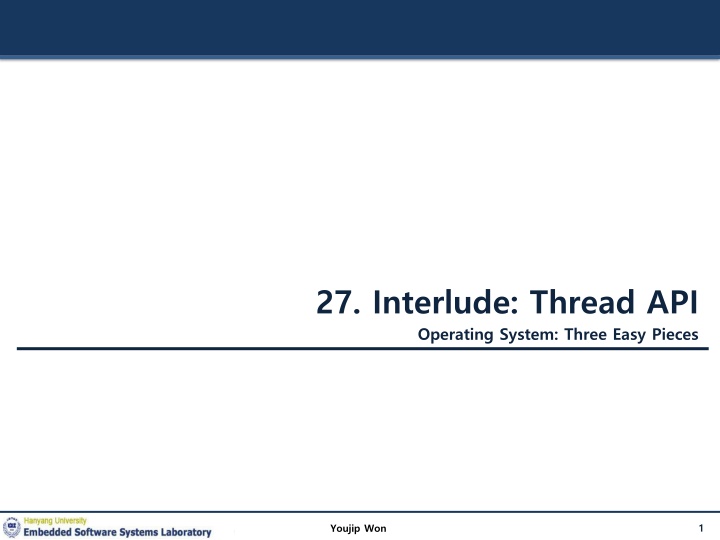
Thread Creation and Management in Operating Systems
Explore the fundamentals of creating and controlling threads in an operating system using examples and explanations. Learn about thread APIs, thread creation, passing arguments to threads, waiting for thread completion, and more.
Download Presentation

Please find below an Image/Link to download the presentation.
The content on the website is provided AS IS for your information and personal use only. It may not be sold, licensed, or shared on other websites without obtaining consent from the author. If you encounter any issues during the download, it is possible that the publisher has removed the file from their server.
You are allowed to download the files provided on this website for personal or commercial use, subject to the condition that they are used lawfully. All files are the property of their respective owners.
The content on the website is provided AS IS for your information and personal use only. It may not be sold, licensed, or shared on other websites without obtaining consent from the author.
E N D
Presentation Transcript
27. Interlude: Thread API Operating System: Three Easy Pieces 1 Youjip Won
Thread Creation How to create and control threads? #include <pthread.h> int pthread_create( pthread_t* thread, const pthread_attr_t* attr, void* (*start_routine)(void*), void* arg); thread: Used to interact with this thread. attr: Used to specify any attributes this thread might have. Stack size, Scheduling priority, start_routine: the function this thread start running in. arg: the argument to be passed to the function (start routine) a void pointer allows us to pass in any type of argument. 2 Youjip Won
Thread Creation (Cont.) If start_routine instead required another type argument, the declaration would look like this: An integer argument: int pthread_create( , // first two args are the same void* (*start_routine)(int), int arg); Return an integer: int pthread_create( , // first two args are the same int void* arg); (*start_routine)(void*), 3 Youjip Won
Example: Creating a Thread #include <pthread.h> typedef struct __myarg_t { int a; int b; } myarg_t; void *mythread(void *arg) { myarg_t *m = (myarg_t *) arg; printf( %d %d\n , m->a, m->b); return NULL; } int main(int argc, char *argv[]) { pthread_t p; int rc; myarg_t args; args.a = 10; args.b = 20; rc = pthread_create(&p, NULL, mythread, &args); } 4 Youjip Won
Wait for a thread to complete int pthread_join(pthread_t thread, void **value_ptr); thread: Specify which thread to wait for value_ptr: A pointer to the return value Because pthread_join() routine changes the value, you need to pass in a pointer to that value. 5 Youjip Won
Example: Waiting for Thread Completion 1 2 3 4 5 6 7 8 9 10 11 12 13 14 15 16 17 18 19 20 21 22 23 24 #include <stdio.h> #include <pthread.h> #include <assert.h> #include <stdlib.h> typedef struct __myarg_t { int a; int b; } myarg_t; typedef struct __myret_t { int x; int y; } myret_t; void *mythread(void *arg) { myarg_t *m = (myarg_t *) arg; printf( %d %d\n , m->a, m->b); myret_t *r = malloc(sizeof(myret_t)); r->x = 1; r->y = 2; return (void *) r; } 6 Youjip Won
Example: Waiting for Thread Completion (Cont.) 25 26 27 28 29 30 31 32 33 34 int main(int argc, char *argv[]) { int rc; pthread_t p; myret_t *m; myarg_t args; args.a = 10; args.b = 20; pthread_create(&p, NULL, mythread, &args); pthread_join(p, (void **) &m); // this thread has been // waiting inside of the // pthread_join() routine. 35 36 37 printf( returned %d %d\n , m->x, m->y); return 0; } 7 Youjip Won
Example: Dangerous code Be careful with how values are returned from a thread. 1 2 3 4 5 6 7 8 void *mythread(void *arg) { myarg_t *m = (myarg_t *) arg; printf( %d %d\n , m->a, m->b); myret_t r; // ALLOCATED ON STACK: BAD! r.x = 1; r.y = 2; return (void *) &r; } When the variable r returns, it is automatically de-allocated. 8 Youjip Won
Example: Simpler Argument Passing to a Thread Just passing in a single value 1 2 3 4 5 6 7 8 9 10 11 12 13 14 void *mythread(void *arg) { int m = (int) arg; printf( %d\n , m); return (void *) (arg + 1); } int main(int argc, char *argv[]) { pthread_t p; int rc, m; pthread_create(&p, NULL, mythread, (void *) 100); pthread_join(p, (void **) &m); printf( returned %d\n , m); return 0; } 9 Youjip Won
Locks Provide mutual exclusion to a critical section Interface int pthread_mutex_lock(pthread_mutex_t *mutex); int pthread_mutex_unlock(pthread_mutex_t *mutex); Usage (w/o lock initialization and error check) pthread_mutex_t lock; pthread_mutex_lock(&lock); x = x + 1; // or whatever your critical section is pthread_mutex_unlock(&lock); No other thread holds the lock the thread will acquire the lock and enter the critical section. If another thread hold the lock the thread will not return from the call until it has acquired the lock. 10 Youjip Won
Locks (Cont.) All locks must be properly initialized. One way: using PTHREAD_MUTEX_INITIALIZER pthread_mutex_t lock = PTHREAD_MUTEX_INITIALIZER; The dynamic way: using pthread_mutex_init() int rc = pthread_mutex_init(&lock, NULL); assert(rc == 0); // always check success! 11 Youjip Won
Locks (Cont.) Check errors code when calling lock and unlock An example wrapper // Use this to keep your code clean but check for failures // Only use if exiting program is OK upon failure void Pthread_mutex_lock(pthread_mutex_t *mutex) { int rc = pthread_mutex_lock(mutex); assert(rc == 0); } These two calls are used in lock acquisition int pthread_mutex_trylock(pthread_mutex_t *mutex); int pthread_mutex_timelock(pthread_mutex_t *mutex, struct timespec *abs_timeout); trylock: return failure if the lock is already held timelock: return after a timeout 12 Youjip Won
Locks (Cont.) These two calls are also used in lock acquisition int pthread_mutex_trylock(pthread_mutex_t *mutex); int pthread_mutex_timelock(pthread_mutex_t *mutex, struct timespec *abs_timeout); trylock: return failure if the lock is already held timelock: return after a timeout or after acquiring the lock 13 Youjip Won
Condition Variables Condition variables are useful when some kind of signaling must take place between threads. int pthread_cond_wait(pthread_cond_t *cond, pthread_mutex_t *mutex); int pthread_cond_signal(pthread_cond_t *cond); pthread_cond_wait: Put the calling thread to sleep. Wait for some other thread to signal it. pthread_cond_signal: Unblock at least one of the threads that are blocked on the condition variable 14 Youjip Won
Condition Variables (Cont.) A thread calling wait routine: pthread_mutex_t lock = PTHREAD_MUTEX_INITIALIZER; pthread_cond_t init = PTHREAD_COND_INITIALIZER; pthread_mutex_lock(&lock); while (initialized == 0) pthread_cond_wait(&init, &lock); pthread_mutex_unlock(&lock); The wait call releases the lock when putting said caller to sleep. Before returning after being woken, the wait call re-acquire the lock. A thread calling signal routine: pthread_mutex_lock(&lock); initialized = 1; pthread_cond_signal(&init); pthread_mutex_unlock(&lock); 15 Youjip Won
Condition Variables (Cont.) The waiting thread re-checks the condition in a while loop, instead of a simple if statement. pthread_mutex_t lock = PTHREAD_MUTEX_INITIALIZER; pthread_cond_t init = PTHREAD_COND_INITIALIZER; pthread_mutex_lock(&lock); while (initialized == 0) pthread_cond_wait(&init, &lock); pthread_mutex_unlock(&lock); Without rechecking, the waiting thread will continue thinking that the condition has changed even though it has not. 16 Youjip Won
Condition Variables (Cont.) Don t ever to this. A thread calling wait routine: while(initialized == 0) ; // spin A thread calling signal routine: initialized = 1; It performs poorly in many cases. just wastes CPU cycles. It is error prone. 17 Youjip Won
Compiling and Running To compile them, you must include the header pthread.h Explicitly link with the pthreads library, by adding the pthread flag. prompt> gcc o main main.c Wall -pthread For more information, man k pthread 18 Youjip Won
Disclaimer: This lecture slide set was initially developed for Operating System course in Computer Science Dept. at Hanyang University. This lecture slide set is for OSTEP book written by Remzi and Andrea at University of Wisconsin. 19 Youjip Won





















